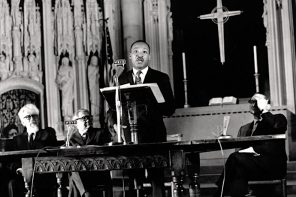Part of the fallout from the debate over health care has been a lively Jew-on-Jew debate in the press over Senator Joseph Lieberman’s Jewish character and what Jewish principles he has used to oppose any wide-scale reform. Even journalists of other faiths, such as David Gibson, a Roman Catholic, are weighing in.
Because there is so little that Lieberman has said about which Jewish texts or traditions he might be using in his decision-making process, the rhetoric on the subject has become an indicator of the writer’s place on the political and Jewish spectrum.
To start things off, Jonathan Chait, writing in The New Republic, contends:
I think one answer here is that Lieberman isn’t actually all that smart. He speaks, and seems to think, exclusively in terms of generalities and broad statements of principle. But there’s little evidence that he’s a sharp or clear thinker, and certainly no evidence that he knows or cares about the details of health care reform. I suspect that Lieberman is the beneficiary, or possibly the victim, of a cultural stereotype that Jews are smart and good with numbers. Trust me, it’s not true. If Senator Smith from Idaho was angering Democrats by spewing uninformed platitudes, most liberals would deride him as an idiot. With Lieberman, we all suspect it’s part of a plan. I think he just has no idea what he’s talking about and doesn’t care to learn.
Less harshly—but still pointedly—one Connecticut rabbi, Ron Fish (from a conservative synagogue in Norwalk), took exception to Lieberman’s assertion that it is his conscience that inspires his obstructionist stance. In an open letter, Rabbi Fish wrote, “For him to say that the public option is weighing on his conscience is a misuse of the term ‘conscience.’” Seventy clergy from different faiths signed Fish’s letter. “Because he invokes his Jewish identity and Jewish values so frequently, we, as a community, should speak to what he is saying,” Fish said.
Many of Connecticut’s liberal Rabbis did not join in signing, because the letter was not strong enough in criticizing Lieberman’s stand, while the Orthodox rabbis—including Lieberman’s own rabbi—have remained silent about the issue. Liberal and Conservative Jews have generally been more activist in the public sphere, using the notion of tikkun olam, perfecting the world, as a plan for secular social action; their criticism of Lieberman’s actions fits both their secular and Jewish agendas.
Sammy Benoit, writing on The Lid, weighs in against liberal and progressive criticisms of Lieberman by contending that they are not legitimate Jewish voices. He says, “Not only is the Reform Movement the most liberal of all forms of Judaism, but it is the least connected with Halacha (traditional Jewish law). Since Lieberman is Modern Orthodox,” he contends, one “probably should have asked an Orthodox rabbi.” Similarly, he delegitimizes the Forward, the famous American Jewish newspaper. He says, “Nor is the Forward a barometer of mainstream Jewish media. The weekly Jewish newspaper the Forward is over 110 years old. But it really ‘cut its teeth’ during the Great Depression in the 1930’s… The Forward’s editorial slant at the time was VERY SOCIALIST. In the ensuing seven-plus decades, the Jewish Population has eased back into the mainstream… still mostly liberal but more centrist. The Forward, now a weekly is still living in the 1930s still on the extreme Progressive side of liberalism.”
In all these discussions, we see a repeat of the “Who is a Jew?” question. Does one have to be a social activist to be Jewish? Or is it about punctilious observance of the 613 Jewish rules? Is it formalism, or activism?
What we do know about Lieberman’s Jewish attitude about the health care debate is that he was willing to participate in Senate debates that took place on the Sabbath, but would walk rather than ride from his residence to Capitol Hill. This fits with his formalist interpretation of the laws of the Sabbath and is consistent with his position as a “Modern Orthodox” Jew.
Historically, Jews have moved back and forth between those two poles. As early as the 7th century B.C.E., the Prophet Isaiah inveighed against Jewish formalism depicting a deity who asks (in Isaiah 1:11) “To what purpose is the multitude of your sacrifices unto Me?” and concluding with the injunction to “Learn to do well: seek justice, relieve the oppressed, judge the fatherless, plead for the widow.” (Isaiah 1:17)
And in 18th century Eastern Europe the pietistic Hasidic movement, led by the Baal Shem Tov, clashed with the “Oppositionists,” the Mitnagdim, who were regarded as Talmudic formalists over the essence of Judaism. More recently, in the 19th century, the Reform movement in Europe and America argued that the essence of Jewish law could be a guide for Jews in the modern world without the necessity of living in isolation from secular society.
Is Lieberman a good Jew or a bad Jew? To answer that, you must decide where you stand in the Jewish denominational spectrum and how important social action is to your brand of Judaism. Since there is no central Jewish authority to which all Jews look and no clear historical guide, you must choose what sort of world—Jewish and secular—you wish to live in. And what sort of politicians you want to represent you.




